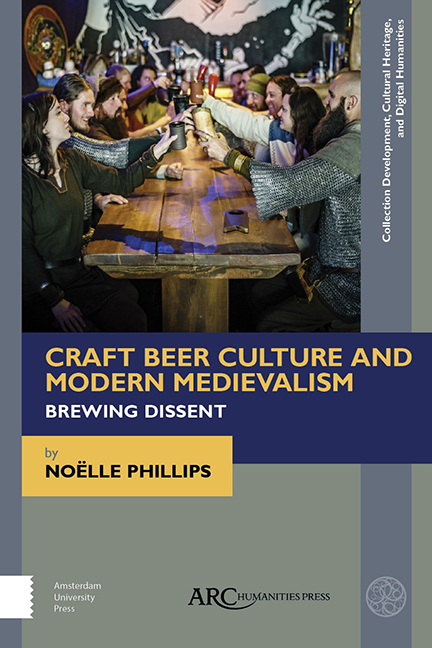Book contents
- Frontmatter
- Contents
- List of Illustrations
- Acknowledgements
- Chapter 1 Introduction: Medievalism and Craft Beer
- Chapter 2 Reading Beer in the Middle Ages
- Chapter 3 Resistance and Revolution: Craft Beer Versus Corporate Giants
- Chapter 4 Beer Heroes and Monastic Medievalism
- Chapter 5 Militant Medievalism: Norsemen, Mythology, and Masculinity
- Chapter 6 Pale Ales and White Knights: Craft Brewing, Whiteness, and Medievalism
- Chapter 7 Conclusion: The Alchemy of Alcohol
- Select Bibliography
- Index
Chapter 1 - Introduction: Medievalism and Craft Beer
Published online by Cambridge University Press: 20 November 2020
- Frontmatter
- Contents
- List of Illustrations
- Acknowledgements
- Chapter 1 Introduction: Medievalism and Craft Beer
- Chapter 2 Reading Beer in the Middle Ages
- Chapter 3 Resistance and Revolution: Craft Beer Versus Corporate Giants
- Chapter 4 Beer Heroes and Monastic Medievalism
- Chapter 5 Militant Medievalism: Norsemen, Mythology, and Masculinity
- Chapter 6 Pale Ales and White Knights: Craft Brewing, Whiteness, and Medievalism
- Chapter 7 Conclusion: The Alchemy of Alcohol
- Select Bibliography
- Index
Summary
IT IS A warm, lazy day in the early summer of 2018; with half an hour to spare, it's the perfect time to hunt for a new craft beer to try. As I scan the labels in the craft beer corner of my neighbourhood liquor store, my eye is caught by bright green rows of bomber bottles at eye level on the centre shelves— they are Driftwood Brewery's Extra Special Bitter, Naughty Hildegard. On the label, the famous twelfth-century abbess is pictured in profile against an emerald green stained glass window, gazing contemplatively at a hop cone in her hand. According to some sources (including the label of this particular beer), Hildegard was one of the first people to recommend hops as a beer preservative and flavouring agent and thus has become somewhat of a legend in beer history. Surveying the surrounding craft beers, I notice the localized nature of their branding; this particular store is on the west coast of British Columbia, Canada, so many of the craft breweries whose products are on display draw upon west coast history, public figures, or wildlife in their marketing strategies. Naughty Hildegard is, like many of the other beers on these shelves, produced in southwestern British Columbia, and yet its branding has no connection to the province. Instead, it is connected to the past— a medieval, Western European past. And this connection is a relatively common one in North America's craft beer industry. The neolocalism that characterizes craft beer in general— its identity as the product of a small and distinct region— manifests itself differently in one segment of the market. Despite the fact that it is actually in ancient Egypt and Mesopotamia that we find the true origins of brewing, the European and medieval replaces the contemporary and local in the narratives woven around a subset of craft beers and breweries in both Canada and the United States. Modern medievalism thus informs, at least in part, the class and cultural identity formation processes at the heart of North America's craft beer industry. It may not be coincidental that medievalism as an object of academic study emerged during the same time period (1978– 1979) in which President Carter legalized homebrewing in the United States and the craft beer industry rapidly expanded in both the United States and Canada.
- Type
- Chapter
- Information
- Craft Beer Culture and Modern MedievalismBrewing Dissent, pp. 1 - 20Publisher: Amsterdam University PressPrint publication year: 2019



